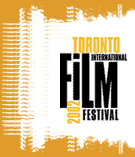
FILM TITLE: Hukkle
Programme: Discovery
Director: Győrgy Pálfi
Country: Hungary
Year: 2002
Time: 75 minutes
Film Types: Colour/35mm
Production
Company: Mokép c/o Magyar Filmunió
Executive Producer: Csaba Bereczki
Producer: András Bőhm
Screenplay: Győrgy Pálfi
Cinematography: Gergely Pohárnok
Editor: Gábor Marinkás
Sound: Tamás Zányi
Music: Balázs Barna, Samu Gryllus
Principal Cast: Ferenc Bandi, Józsefné Rácz, József Forkas,
Ferenc Nagy, Jánosné Nagy
In his debut feature, György Pálfi presents a mesmerizing, unconventional
murder mystery set against the sedate backdrop of rural Hungarian
life. As the film progresses, its action ushered in by an old
man’s bout of hiccups at the side of a road, an unusual fact
emerges: no dialogue is ever spoken. Still, this cannot be mistaken
for a silent film. Hukkle is a work with an elaborately structured
soundtrack (what the director calls a “conceptual soundscape”)
that reveals the aural minutiae of every scene: we never hear
anyone speaking, but we do hear the sound of grass growing,
women sewing, men bowling – all rhythmically intercut with the
old man’s hiccups.
Hukkle
is relentlessly inventive and ceaselessly delightful. Pálfi
has crafted a daring technical tour de force that produces its
complexities out of its simplicity. The film’s amalgamation
of intense scenic meditation and crime story owes a little to
Ron Fricke’s quietly atmospheric Baraka at the same time that
it evokes the noir suspense of Russell Rouse’s wordless The
Thief.
In
the end, however, Hukkle is in a class all its own, turning
subtle observation of daily life in the human and natural worlds
into an intricate thriller before our very eyes. Significantly,
it seems, all of the individuals who populate this uncanny community
are accessories – if not to the crime that is eventually revealed,
then at least to this cunning director’s fascinating stratagem.
Hukkle
is splendidly shot, making the most of both its faintly implied
documentary style and its brilliant, surprising manipulation
of special effects. Its sonic rigour and stunning cinematography
fuse seamlessly to produce a perfectly pitched series of riddles.
“Hukkle” is onomatopoeic for the sound of a hiccup, a reference
that takes in the structurally integral figure of the old man
and also hints at the levity with which Pálfi conceived and
executed the film. A flawless exercise in wordless narrative,
Hukkle never seems pedantic or precious, but remains fresh and
kaleidoscopic at every turn.
by
Dimitri
Eipides
back





